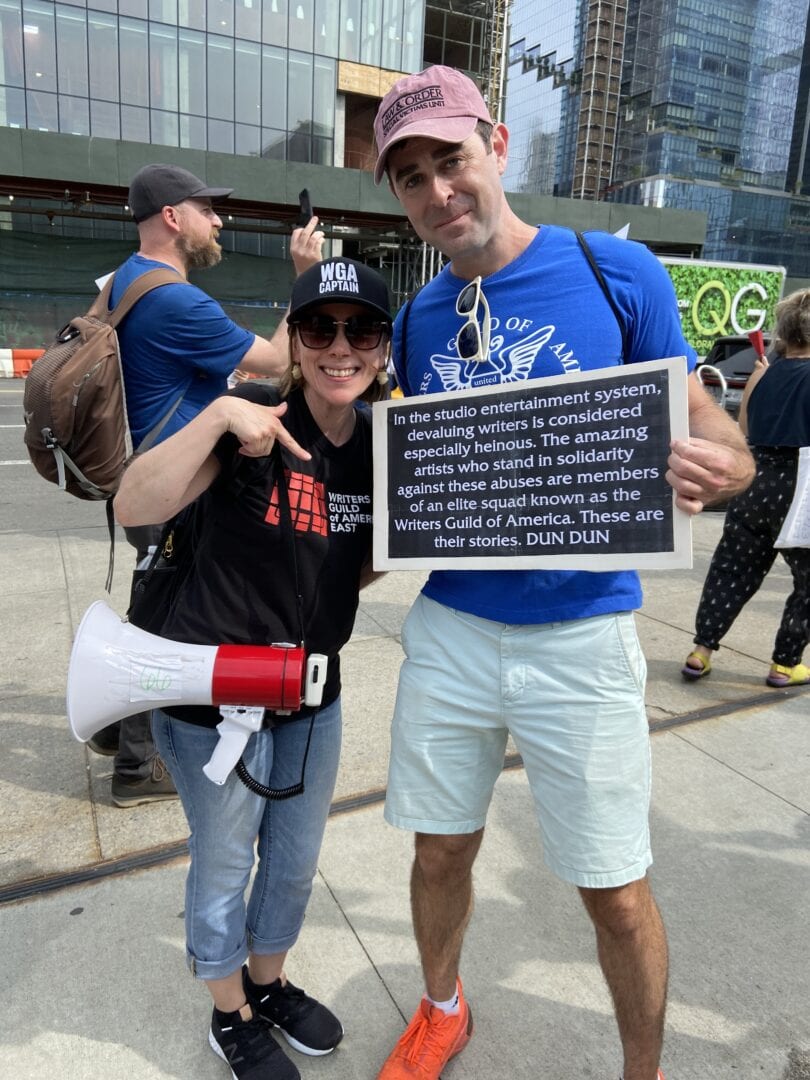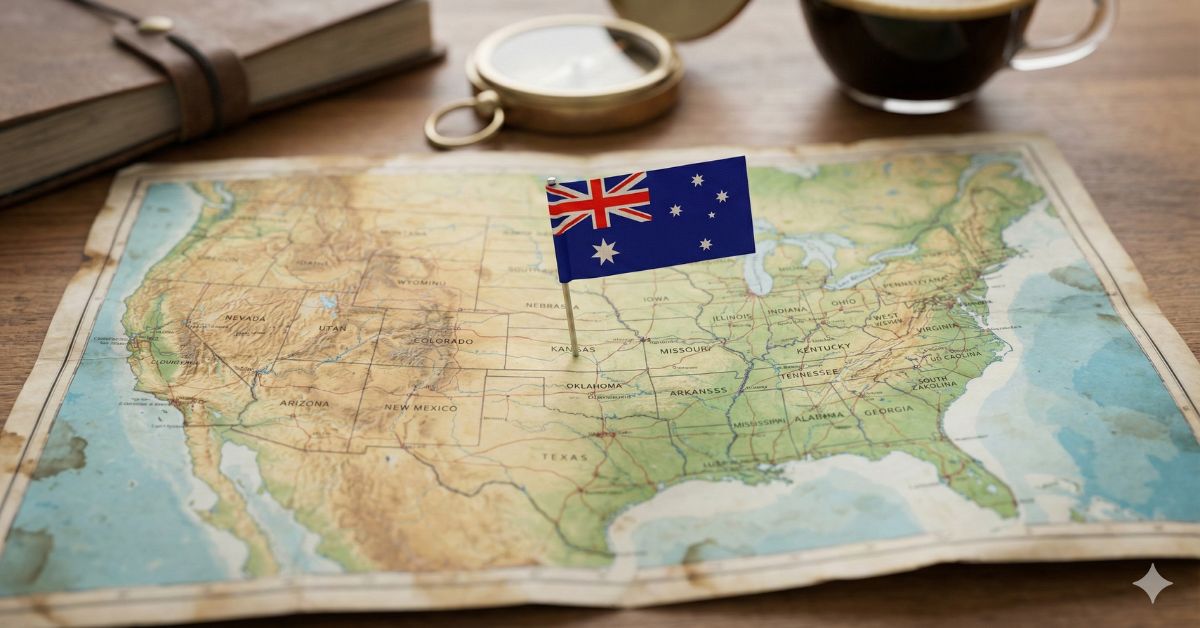While I love contributing to the community here, and trying to convince y’all that New Jersey is awesome (see here and here) I mostly write TV and theatre. When a certain kind of person hears that they’ll ask “have you done anything I’ve heard of?” After being over here for a few years, it was my great joy to respond to that question with the longest running live action drama in the US, “Law & Order: SVU”. Writing for the series was quite literally a dream come true and had many “pinch me!” moments. One “pinch me!” moment early on was when I entered the Writers Guild of America (WGA) through working on the show. The WGA represents 11,500 film and television writers.
Entering the WGA represents a level of professional success. You may have heard about the WGA recently in the news, as we are on strike (and have been now since May 2).
Why are we on strike?
To give you a little context, the WGA attempted to reach a fair contract with the Alliance of Motion Picture and Television Producers (AMPTP). Midway through negotiations, the WGA put out a Strike Authorization Vote, with 97.85% of us members voting in favor of a strike. I’m not sure if you’ve ever tried to have a group of artists, specifically writers, to agree on anything, especially when the stakes are as high as walking away from beloved work and vital income. The vote was an historic high.
The most important issues vary from writer to writer, but the impact of streaming platforms affects all of us. To begin with, we don’t know how many times any show is watched on a platform. Even as the writers of the show, we can’t find out that information. In Network TV, writers are compensated each time their episode is on TV. But for streaming platforms, writers receive a fixed payment, and very little further payment. Shows can therefore be watched millions and millions of times, and writers do not share in the financial success of their shows.
When I woke up on May 2, there was the email from the WGA in my inbox, that we had not reached an agreement with the studios and streamers, and we were indeed on strike. Also in the email was a comprehensive breakdown of where the negotiations had ended up. On the issue of viewership-based streaming residuals, the AMPTP had “Rejected our proposal. Refused to make a counter.” This was not the only issue that the AMPTP had “Rejected our proposal. Refused to make a counter”. For the heated issue of AI, the AMPTP had rejected our proposal for regulation, and countered with offering “annual meetings to discuss advancements in technology”. They offered sandwiches in the place of regulation.
Of course there’s many more issues on the negotiating table than the couple I’ve discussed here. But we are not being unreasonable in our proposals; if we got everything we are asking for, it would cost the studios less than 2% of the profits they make from our work.
But aren’t the streamers losing money?
This is one of the most common questions I get when I start talking about why we are on strike. While this may have been true in the past, Netflix reported $6 billion in profits last year. Disney and Warner predict their streaming services will be profitable by 2024 and 2025, respectively.
Also, while you may have heard about big layoffs of staff in this sector, the studios this year are investing nearly $19 billion producing content for streaming platforms. This is up from $5 billion in 2019. This is obviously an enormous jump in spending, and the studios clearly have cash to spend.
But while budgets to make the shows we write have ballooned, writers’ pay has gone backwards. Median TV writer-producer pay has fallen 4% over this last decade of “peak TV”. When adjusting for inflation, that number climbs to 23%.

Best picket line signs
Without TV to write, that creativity is being directed into our picket line signs! Here are some of my favorites (and explanations where needed):
“In the studio entertainment system, devaluing writers is considered especially heinous. The amazing artists who stand in solidarity against these abuses are members of an elite squad known as the Writers Guild of America. These are their stories. DUN DUN” (Credit to the brilliant Robert Brooks Cohen, a fellow alum SVU writer. See pic for the correct font!)
“AMPTP (41), Greedy but she doesn’t know it” (This is written in the format of how a character is described in a script. It is a play on a problematic trope “Pretty but she doesn’t know it” for female characters. Credit to Jennifer Raite)
“AI doesn’t have childhood trauma”
“Witty sign TK” (TK in a script means “to come”. If you know why this abbreviation is not TC, please let me know!)
What does the strike mean to you?
If you watch late-night comedy shows or “Saturday Night Live”, you would have immediately noticed that with the strike, there are no new shows. The impact on other TV series is a little more delayed. Most network TV series would have already started writing their next season by now. Filming usually begins in the summer for fall premieres. Streaming platforms don’t have such an annual cycle, but new seasons of headliner shows are being delayed, for example the stoppage of the writers’ room of the final season of “The Handmaid’s Tale” and production pausing on the final season of “Stranger Things”.
We don’t want to be interrupting your favorite TV shows. We want to be making them! But this disruption will cost the studios financially, with the aim of bringing them back to the negotiating table ASAP.
Also to zoom out for a moment, if you have anyone in your life who aspires to work in Hollywood, this fight is for the sustainability of our careers. A typical career as a writer, actor or director involves a lot of (usually not very well paid) work on your craft, to reach the point where you get on a TV show or film for a major studio. Work is irregular and getting the next job can require a lot of unpaid work; just ask any actor about the volume of time they spend auditioning. What makes our careers possible is sharing in the profits made by our work. This gets us through the lean times, and gets us a pension and health insurance.
Finally to zoom out even further, we are of course not the only industry where tech disruptors have led to a decrease in pay for workers. While the CEOs of these companies make millions of dollars, workers are fighting for fair pay. Last year, 8 Hollywood CEOs made nearly $800 million. The proposals we made in negotiations would gain writers approximately $429 million per year. This $429 million would be earned across the WGA membership of 11,500 writers.
When will the strike be over?
I also get asked this question a lot, and the answer is, when we get a fair contract. We want this to be over as fast as you do. We’d love to get back into writing and producing ASAP. We just need the AMPTP to come back to the negotiating table with a fair contract.
If you’d like to find out how to support us in the strike, information can be found here.


















